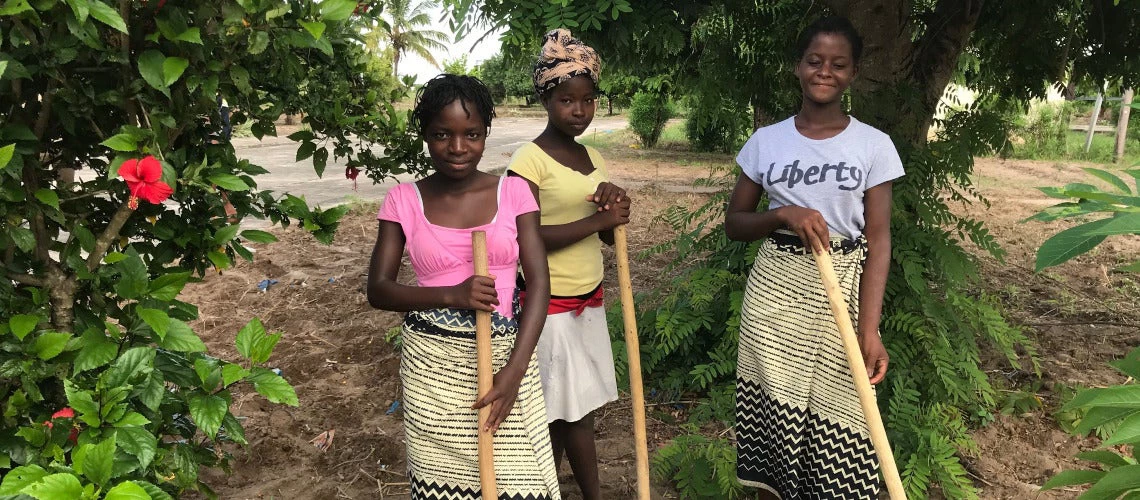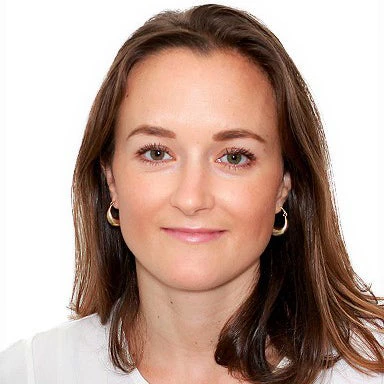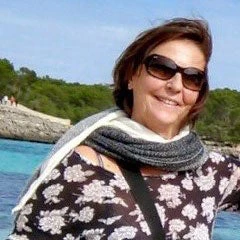 Maria, Amelia and Amelia working in the boarding school “machamba,” an agricultural field.
Maria, Amelia and Amelia working in the boarding school “machamba,” an agricultural field.
A few months ago, before the COVID-19 (coronavirus) pandemic turned the world upside down, we visited Amelia and her friends Maria and Amelia in their village of Nhamiambe in Marromeu District, in the central Mozambican province of Sofala. They were excited; at 12 and 13, they were leaving home for the first time to do something that many girls in rural Mozambican villages can only dream of: complete secondary school.
With support from the World Bank’s Conservation Areas for Biodiversity and Development (MozBio) project, the three girls — along with 27 others from neighboring districts around the Marromeu National Reserve— traveled to the town of Caia, more than100 kilometers away. When we visited them a couple of weeks before their departure, we also met their parents and despite the inevitable sadness of farewells, the families were all smiles. This opportunity was beyond anything they ever could have hoped for their daughters.
While no one says explicitly what other pathway they expected for the girls, the reality is clear. Just a few days before Amelia and her friends were due to leave for Caia, one of the other girls selected for the scholarship program dropped out when her parents married her away. School dropouts and teenage pregnancies are a common reality for many young women and girls in rural Mozambique, where premature marriage is widespread and often seen as a way for the family to earn extra money.
Fast forward to June 2020, and the girls are finding themselves in a different reality, or should we say, familiar. At the end of March, the first cases of the COVID-19 were confirmed in Mozambique and a nationwide state of emergency was declared, closing schools throughout the country. The girls had to leave their boarding school and return to their villages.
If you think homeschooling is challenging, try doing it in Nhambine! Here, classes are taken over community radio, at least on some days of the week. Assignments and homework are still plentiful, and it is hard for the girls to keep up, especially when they can’t do group work together like they enjoyed doing at boarding school. Yet, with help of community liaison officers from the Marromeu National Reserve and schoolteachers living in their village, they manage to keep up.
The wider effort of the MozBio project supports 67 girls with scholarships and accommodations in boarding homes around Maputo Special Reserve, Chimanimani National Reserve and Marromeu. The project is also helping 60 schools in these areas to roll out environmental education as part of the curriculum, aiming to raise awareness and engagement from youth in preserving Mozambique’s precious biodiversity and natural resources. In each school, the project has also established girls and youth clubs that provide mentoring for reading, writing, and numeracy skills and serves as a platform to access safe knowledge regarding girls’ and boys’ reproductive health.
Increasing girls’ access to education and empowering women has become a core intervention area of the Mozambique Integrated Landscape Management (ILM) Portfolio, of which MozBio is part. Mozambique’s natural resources and its Conservation Areas, which cover 25% of the country, do not exist in isolation – they co-exist with communities. To achieve our environmental goals and have a lasting impact, there is a need to address interlinked dynamics of high illiteracy rates, low incomes, environmental degradation and gender inequality regarding access and use of natural resources.
To expand the ILM Portfolio’s gender responsiveness, a Gender Gap Analysis and Action Plan for the Portfolio was recently finalized. The plan aims to provide guidance on how natural resource management projects can address common manifestations of gender inequality that limit women ́s development, their potential to generate wealth for their families, communities and the economy as a whole and their participation in managing natural resources. Beside interventions to increase women’s participation in sustainable value chains, the plan places strong emphasis on engaging men and boys and addressing gender inequality at a household level.
One approach is through the Gender Action Learning System (GALS) – a step-by-step household methodology that mentors households (both men and women) to identify barriers to economic and social progress – which oftentimes are linked to gendered division of labor in the household – and work together to find solutions and build stronger and more diverse livelihoods. Experience from Mozambique shows that GALS helps households increase their combined income, enjoy greater household equality and division of labor, and a stronger voice by women in the household and community. The portfolio is also supporting Community Savings and Credit Groups that help 3,000 households, primarily women, to improve financial planning and savings of households, which largely enables to keep children in school or practice ecologically sound farming practices.
So, as COVID-19 continues to bring global uncertainty and gender differential impacts related to health, education, economic activities and gender-based violence, the ILM Portfolio remains firm in its gender responsiveness. For Amelia, Maria and Amelia, this means that they will receive assistance and mentoring along their educational journey, helping them plan for what will come after school. For local government and conservation partners, this means using the gender gap analysis and action plan as a blueprint – knowing that addressing gender inequality in households, schools, and communities, the chances of biodiversity conservation are also increased.



Join the Conversation